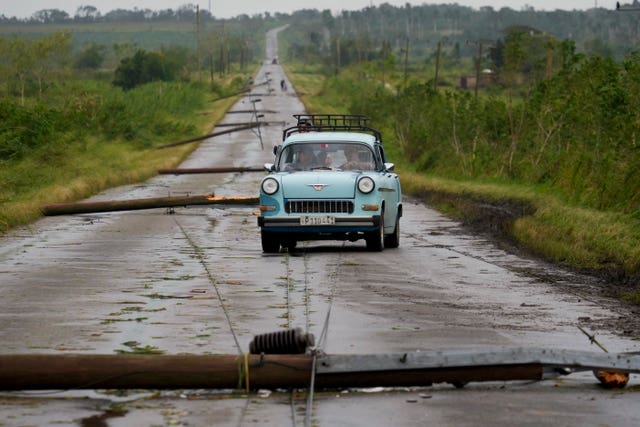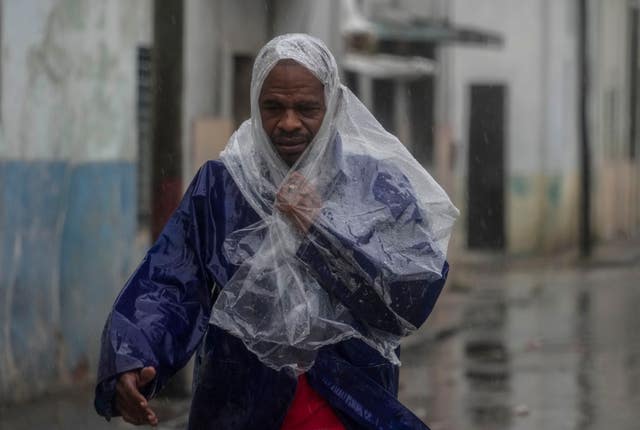
Cuba was left reeling on Thursday after a fierce Category 3 hurricane ripped across the island, knocking out the country’s power grid, downing trees and damaging infrastructure.
No deaths were immediately reported.
Hurricane Rafael crossed a western portion of Cuba on Wednesday about 45 miles west of Havana, where Jose Ignacio Dimas returned home from his night shift as a security guard to find his apartment building in the historic centre of the city had collapsed.
“The entire front wall of the building fell,” he said in a tight voice as he scanned the damage early Thursday. Like many buildings in the capital, it was aging and lacked maintenance.
4AM EST Nov 7: Here are the latest Key Messages for Rafael. For the latest visit https://t.co/tW4KeGe9uJ pic.twitter.com/L72GGKm5Vc
— National Hurricane Center (@NHC_Atlantic) November 7, 2024
Some 50,000 people took shelter in Havana, with thousands more doing the same in regions south and just west of the capital since they lived in flood zones or in flimsy homes.
The main road from Havana to the southern coastal city of Batabano was strewn with dozens of utility poles and wires.
Lazaro Guerra, electricity director for the ministry of energy and mines, said power had been partially restored in the island’s western region and that generation units were powering back up.
But he warned that restoring power would be slow-going as crews took safety precautions.
As Rafael ploughed across Cuba on Wednesday it slowed to a Category 2 hurricane as it chugged into the Gulf of Mexico before heading toward Mexico, according to the National Hurricane Centre in Miami.

Late Thursday morning, the hurricane was about 200 miles west-northwest of Havana. It had maximum sustained winds of 100 mph and was moving west-northwest at nine mph.
Earlier in the week, Rafael brushed past Jamaica and battered the Cayman Islands, downing trees and power lines and unleashing heavy flooding in some areas.
Authorities in Jamaica are searching for a couple last seen inside a car that was swept away by floodwaters, police told Radio Jamaica News.
Thousands of people in Jamaica and Little Cayman remained without power as crews worked to restore electricity after the storm.
Rafael was expected to keep weakening as it spins over open waters and heads toward northern Mexico, although the hurricane centre said there was “above average uncertainty” in the storm’s future track.

Meanwhile, many Cubans were left picking up the pieces from Wednesday night, after a rocky few weeks in the Caribbean nation.
In October, the island was hit by a one-two punch.
First, it was hit by island-wide blackouts stretching on for days, a product of the island’s energy crisis. Shortly after, it was slapped by a powerful hurricane that struck the eastern part of the island and killed at least six people.
The disasters have stoked discontent already simmering in Cuba amid an ongoing economic crisis, which has pushed many to migrate.
Classes and public transport were suspended on parts of the island and authorities cancelled flights in and out of Havana and Varadero. Thousands of people in the west of the island had been evacuated from their homes as a preventative measure.
Rafael is the 17th named storm of the season.
The National Oceanic and Atmospheric Administration predicted the 2024 hurricane season was likely to be well above average, with between 17 and 25 named storms.
The forecast was for as many as 13 hurricanes and four major hurricanes.
An average Atlantic hurricane season produces 14 named storms, seven of them hurricanes and three major hurricanes.


Why are you making commenting on The Herald only available to subscribers?
It should have been a safe space for informed debate, somewhere for readers to discuss issues around the biggest stories of the day, but all too often the below the line comments on most websites have become bogged down by off-topic discussions and abuse.
heraldscotland.com is tackling this problem by allowing only subscribers to comment.
We are doing this to improve the experience for our loyal readers and we believe it will reduce the ability of trolls and troublemakers, who occasionally find their way onto our site, to abuse our journalists and readers. We also hope it will help the comments section fulfil its promise as a part of Scotland's conversation with itself.
We are lucky at The Herald. We are read by an informed, educated readership who can add their knowledge and insights to our stories.
That is invaluable.
We are making the subscriber-only change to support our valued readers, who tell us they don't want the site cluttered up with irrelevant comments, untruths and abuse.
In the past, the journalist’s job was to collect and distribute information to the audience. Technology means that readers can shape a discussion. We look forward to hearing from you on heraldscotland.com
Comments & Moderation
Readers’ comments: You are personally liable for the content of any comments you upload to this website, so please act responsibly. We do not pre-moderate or monitor readers’ comments appearing on our websites, but we do post-moderate in response to complaints we receive or otherwise when a potential problem comes to our attention. You can make a complaint by using the ‘report this post’ link . We may then apply our discretion under the user terms to amend or delete comments.
Post moderation is undertaken full-time 9am-6pm on weekdays, and on a part-time basis outwith those hours.
Read the rules here